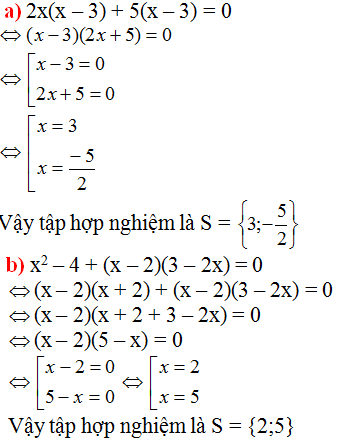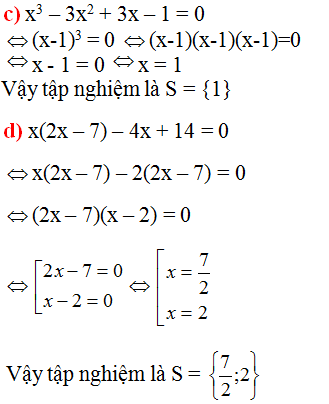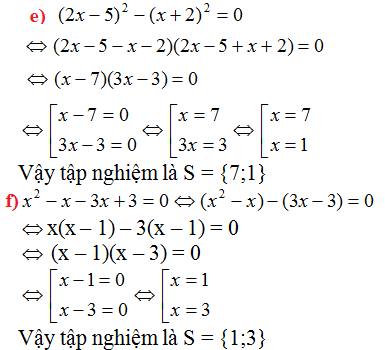Hãy nhập câu hỏi của bạn vào đây, nếu là tài khoản VIP, bạn sẽ được ưu tiên trả lời.

+)\(\left(x-1\right)^2+2=\left(x-2\right)^2\)
\(\Leftrightarrow\left(x-2\right)^2-\left(x-1\right)^2=2\)
\(\Leftrightarrow\left(x-2-x+1\right)\left(x-2+x-1\right)=2\)
\(\Leftrightarrow-1\left(2x-3\right)=2\)
\(\Leftrightarrow2x-3=-2\)
\(\Leftrightarrow2x=1\)
\(\Leftrightarrow x=\frac{1}{2}\)
Vậy tập nghiệm của pt 1 là \(S=\left\{\frac{1}{2}\right\}\)
+)\(2x^3-x^2+2x-1=0\)
\(\Leftrightarrow x^2\left(2x-1\right)+\left(2x-1\right)=0\)
\(\Leftrightarrow\left(2x-1\right)\left(x^2+1\right)=0\)
\(\Leftrightarrow\orbr{\begin{cases}2x-1=0\\x^2+1=0\end{cases}\Leftrightarrow\orbr{\begin{cases}x=\frac{1}{2}\\x^2=-1\left(\text{loại}\right)\end{cases}}}\)
Vậy tập nghiệm của pt 2 là \(S=\left\{\frac{1}{2}\right\}\)
Xét thấy 2 pt có tập nghiệm như nhau nên 2 pt này tương đương
*\(\left(x-1\right)^2+2=\left(x-2\right)^2\)
\(\Leftrightarrow x^2-2x+1+2=x^2-4x+4\)
\(\Leftrightarrow x^2-x^2-2x+4x=-1-2+4\)
\(\Leftrightarrow2x=1\Leftrightarrow x=\frac{1}{2}\)
Vậy phương trình có tập nghiệm S= { 1/2 } (1)
*\(2x^3-x^2+2x-1=0\)
\(\Leftrightarrow x^2\left(2x-1\right)+\left(2x-1\right)=0\)
\(\Leftrightarrow\left(2x-1\right)\left(x^2+1\right)=0\)
\(\Leftrightarrow2x-1=0\) ( vì x2 + 1 luôn khác 0 với mọi x )
\(\Leftrightarrow2x=1\Leftrightarrow x=\frac{1}{2}\)
Vậy phương trình có tập nghiệm là S = {1/2} (2)
Từ (1) và (2) suy ra : 2 phương trình đã cho tương đương nhau

\(a,2x\left(x-3\right)+5\left(x-3\right)=0\)
\(\Leftrightarrow\left(2x+5\right)\left(x-3\right)=0\)
\(\Leftrightarrow\orbr{\begin{cases}2x+5=0\\x-3=0\end{cases}}\Leftrightarrow\orbr{\begin{cases}2x=-5\\x=3\end{cases}}\Leftrightarrow\orbr{\begin{cases}x=-\frac{5}{2}\\x=3\end{cases}}\)
Vậy .........
\(b,\left(x^2-4\right)+\left(x-2\right)\left(3-2x=0\right)\)
\(\Leftrightarrow x^2-4-2x^2+7x-6=0\)
\(\Leftrightarrow-x^2+7x-10=0\)
\(\Leftrightarrow-\left(x-5\right)\left(x-2\right)=0\)
\(\Leftrightarrow\orbr{\begin{cases}x=5\\x=2\end{cases}}\)
Vậy ..................
\(c,x^3-3x^2+3x-1=0\)
\(\Leftrightarrow\left(x-1\right)^3=0\)
\(\Leftrightarrow x=1\)
\(d,x\left(2x-7\right)-4x+14=0\)
\(\Leftrightarrow2x^2-7x-4x+14=0\)
\(\Leftrightarrow2x^2-11x+14=0\)
\(\Leftrightarrow\left(2x-7\right)\left(x-2\right)=0\)
\(\Leftrightarrow\orbr{\begin{cases}x=\frac{7}{2}\\x=2\end{cases}}\)
Vậy ............
\(e,\left(2x-5\right)^2-\left(x+2\right)^2=0\)
\(\Leftrightarrow4x^2-20x+25-x^2-4x-4=0\)
\(\Leftrightarrow3x^2-24x+21=0\)
\(\Leftrightarrow3\left(x-7\right)\left(x-1\right)=0\)
\(\Leftrightarrow\orbr{\begin{cases}x-7=0\\x-1=0\end{cases}}\Leftrightarrow\orbr{\begin{cases}x=7\\x=1\end{cases}}\)
Vậy .....................
\(f,x^2-x-\left(3x-3\right)=0\)
\(\Leftrightarrow x^2-x-3x+3=0\)
\(\Leftrightarrow x^2-4x+3=0\)
\(\Leftrightarrow\left(x-3\right)\left(x-1\right)=0\)
\(\Leftrightarrow\orbr{\begin{cases}x-3=0\\x-1=0\end{cases}}\Leftrightarrow\orbr{\begin{cases}x=3\\x=1\end{cases}}\)
Vậy ..............

\(\left(x-2\right)^2+\left|x-5\right|-x^2-14=0.\)
\(\left(x^2-4x+4\right)+\left|x-5\right|-x^2-14=0.\)
\(x\text{}\text{}\text{}^2-4x+4+\left|x-5\right|-x^2-14=0.\)
\(x\text{}\text{}\text{}^2-x^2-4x+4-14+\left|x-5\right|=0.\)
\(-4x-10+\left|x-5\right|=0\)
.. đến đây xét tiếp để ra kq ạ -,-

a) \(\left(x+1\right)\left(2x-1\right)\left(-x+2\right)=0\)
\(\Leftrightarrow\left[\begin{matrix}x+1=0\\2x-1=0\\-x+2=0\end{matrix}\right.\Leftrightarrow\left[\begin{matrix}x=-1\\x=\frac{1}{2}\\x=2\end{matrix}\right.\)
Vậy phương trình có tập nghiệm là \(S=\left\{-1;\frac{1}{2};2\right\}\)
b) \(\left(2x-1\right)\left(3x+2\right)\left(4x-5\right)\left(x-7\right)=0\)
\(\Leftrightarrow\left[\begin{matrix}2x-1=0\\3x+2=0\\4x-5=0\\x-7=0\end{matrix}\right.\Leftrightarrow\left[\begin{matrix}x=\frac{1}{2}\\x=-\frac{2}{3}\\x=\frac{5}{4}\\x=7\end{matrix}\right.\)
Vậy phương trình có tập nghiệm là \(S=\left\{\frac{1}{2};-\frac{2}{3};\frac{5}{4};7\right\}\)
c) \(x^2-6x+11=0\)
\(\Leftrightarrow x^2-6x+9+2=0\)
\(\Leftrightarrow\left(x-3\right)^2+2=0\) (vô lí)
Vậy phương trình vô nghiệm
d) \(\left(x^2+2x+3\right)\left(x^2-25\right)\left(x+19\right)=0\)
\(\Leftrightarrow\left(x^2+2x+1+2\right)\left(x+5\right)\left(x-5\right)\left(x+19\right)=0\)
\(\Leftrightarrow\left[\left(x+1\right)^2+2\right]\left(x+5\right)\left(x-5\right)\left(x+19\right)=0\)
\(\Leftrightarrow\left[\begin{matrix}x+5=0\\x-5=0\\x+19=0\end{matrix}\right.\Leftrightarrow\left[\begin{matrix}x=-5\\x=5\\x=-19\end{matrix}\right.\)
Vậy phương trình có tập nghiệm là \(S=\left\{\pm5;-19\right\}\)
a,b,d dễ mà bạn tự làm
c,x2-6x+11=0<=> x2-6x+9+2=0
<=>(x-3)2=-2(vô lý)
vậy pt vô nghiệm

a) (x-1)(5x+3)=(3x-8)(x-1)
= (x-1)(5x+3)-(3x-8)(x-1)=0
=(x-1)[(5x+3)-(3x-8)]=0
=(x-1)(5x+3-3x+8)=0
=(x-1)(2x+11)=0
\(\Leftrightarrow\) x-1=0 hoặc 2x+11=0
\(\Leftrightarrow\) x=1 hoặc x=\(\dfrac{-11}{2}\)
Vậy S={1;\(\dfrac{-11}{2}\)}
b) 3x(25x+15)-35(5x+3)=0
=3x.5(5x+3)-35(5x+3)=0
=15x(5x+3)-35(5x+3)=0
=(5x+3)(15x-35)=0
\(\Leftrightarrow\) 5x+3=0 hoặc 15x-35=0
\(\Leftrightarrow\) x=\(\dfrac{-3}{5}\) hoặc x=\(\dfrac{7}{3}\)
Vậy S={\(\dfrac{-3}{5};\dfrac{7}{3}\)}
c) (2-3x)(x+11)=(3x-2)(2-5x)
=(2-3x)(x+11)-(3x-2)(2-5x)=0
=(3x-2)[(x+11)-(2-5x)]=0
=(3x-2)(x+11-2+5x)=0
=(3x-2)(6x+9)=0
\(\Leftrightarrow\) 3x-2=0 hoặc 6x+9=0
\(\Leftrightarrow\) x=\(\dfrac{2}{3}\) hoặc x=\(\dfrac{-3}{2}\)
Vậy S={\(\dfrac{2}{3};\dfrac{-3}{2}\)}
d) (2x2+1)(4x-3)=(2x2+1)(x-12)
=(2x2+1)(4x-3)-(2x2+1)(x-12)=0
=(2x2+1)[(4x-3)-(x-12)=0
=(2x2+1)(4x-3-x+12)=0
=(2x2+1)(3x+9)=0
\(\Leftrightarrow\)2x2+1=0 hoặc 3x+9=0
\(\Leftrightarrow\)x=\(\dfrac{1}{2}\)hoặc x=\(\dfrac{-1}{2}\) hoặc x=-3
Vậy S={\(\dfrac{1}{2};\dfrac{-1}{2};-3\)}
e) (2x-1)2+(2-x)(2x-1)=0
=(2x-1)[(2x-1)+(2-x)=0
=(2x-1)(2x-1+2-x)=0
=(2x-1)(x+1)=0
\(\Leftrightarrow\) 2x-1=0 hoặc x+1=0
\(\Leftrightarrow\) x=\(\dfrac{-1}{2}\) hoặc x=-1
Vậy S={\(\dfrac{-1}{2}\);-1}
f)(x+2)(3-4x)=x2+4x+4
=(x+2)(3-4x)=(x+2)2
=(x+2)(3-4x)-(x+2)2=0
=(x+2)[(3-4x)-(x+2)]=0
=(x+2)(3-4x-x-2)=0
=(x+2)(-5x+1)=0
\(\Leftrightarrow\) x+2=0 hoặc -5x+1=0
\(\Leftrightarrow\) x=-2 hoặc x=\(\dfrac{1}{5}\)
Vậy S={-2;\(\dfrac{1}{5}\)}

a) đặt \(\left(x^2+x\right)\)là \(y\)
ta có: \(3y^2-7y+4\)\(=0\)
<=>\(\left(3y-4\right)\left(y-1\right)=0\)
còn lại bạn tự xử nhé

Bài 3:
a) \(\left(x-6\right).\left(2x-5\right).\left(3x+9\right)=0\)
\(\Leftrightarrow\left(x-6\right).\left(2x-5\right).3.\left(x+3\right)=0\)
Vì \(3\ne0.\)
\(\Leftrightarrow\left[{}\begin{matrix}x-6=0\\2x-5=0\\x+3=0\end{matrix}\right.\Leftrightarrow\left[{}\begin{matrix}x=6\\2x=5\\x=-3\end{matrix}\right.\Leftrightarrow\left[{}\begin{matrix}x=6\\x=\frac{5}{2}\\x=-3\end{matrix}\right.\)
Vậy phương trình có tập hợp nghiệm là: \(S=\left\{6;\frac{5}{2};-3\right\}.\)
b) \(2x.\left(x-3\right)+5.\left(x-3\right)=0\)
\(\Leftrightarrow\left(x-3\right).\left(2x+5\right)=0\)
\(\Leftrightarrow\left[{}\begin{matrix}x-3=0\\2x+5=0\end{matrix}\right.\Leftrightarrow\left[{}\begin{matrix}x=3\\2x=-5\end{matrix}\right.\Leftrightarrow\left[{}\begin{matrix}x=3\\x=-\frac{5}{2}\end{matrix}\right.\)
Vậy phương trình có tập hợp nghiệm là: \(S=\left\{3;-\frac{5}{2}\right\}.\)
c) \(\left(x^2-4\right)-\left(x-2\right).\left(3-2x\right)=0\)
\(\Leftrightarrow\left(x^2-2^2\right)-\left(x-2\right).\left(3-2x\right)=0\)
\(\Leftrightarrow\left(x-2\right).\left(x+2\right)-\left(x-2\right).\left(3-2x\right)=0\)
\(\Leftrightarrow\left(x-2\right).\left(x+2-3+2x\right)=0\)
\(\Leftrightarrow\left(x-2\right).\left(3x-1\right)=0\)
\(\Leftrightarrow\left[{}\begin{matrix}x-2=0\\3x-1=0\end{matrix}\right.\Leftrightarrow\left[{}\begin{matrix}x=2\\3x=1\end{matrix}\right.\Leftrightarrow\left[{}\begin{matrix}x=2\\x=\frac{1}{3}\end{matrix}\right.\)
Vậy phương trình có tập hợp nghiệm là: \(S=\left\{2;\frac{1}{3}\right\}.\)
Chúc bạn học tốt!



Mỗi câu mình sẽ chia làm 2 phần( VT là ( 1 ) ,VP là ( 2 ) nha bạn !!!
a)
(1) (x -1)2 + 2 = (x-2)2
<=> x2 -2x + 1 + 2 =x2 - 4x + 4
<=> 2x = 1
<=> x = 1/2
(2) 2x3 -x2 + 2x - 1 = 0
<=> ( x - \(\frac{1}{2}\)) = 0
<=>x = 1/2
Vậy 2 PT trên tương đương
d)
(1) x + 1 = x là phương trình vô số no
(2) x3 + 1 = 0 là PT vô no
=> 2 pt trên không tương đương
c) và b) thì ...